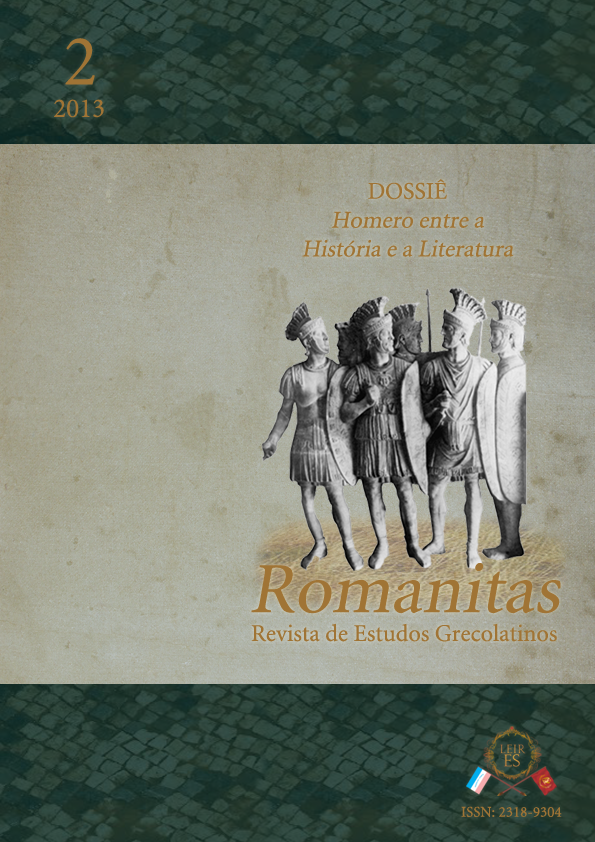A relação entre a identidade helênica e o espaço ocupado: Telêmaco em Ítaca
DOI :
https://doi.org/10.17648/rom.v0i2.7442Mots-clés :
Odisseia, Homero, Espaço, Identidade, IsotopiaRésumé
Neste artigo trabalharemos com a ideia de que os locais descritos na Odisseia, poema épico atribuído à Homero, podem, de certa forma, dizer algo sobre a maneira como o espaço era pensado e significado na Idade do Ferro antiga. Acreditamos, ainda, que as interações sociais realizadas nos espaços podem influenciar no modo pelo qual o ser humano entende e representa a si mesmo e os outros ao seu redor. Nesse sentido, a análise das aventuras de Telêmaco (Telemaquia – os quatros primeiros cantos da Odisseia) poderá nos auxiliar na tarefa de compreender a forma na qual os gregos entendiam o lugar (topos) em que viviam e o que faz dele um lugar de identidade (isotopia).
Téléchargements
Références
Documentação primária impressa
HOMERO. Odisseia. Tradução, posfácio e notas de Trajano Vieira. São Paulo: Editora 34, 2011.
HOMERUS. Odyssea. Edited by H. van THIEL. Hildesheim: Olms, 1991.
Obras de apoio
ANTONACCIO, C. M. Colonization: Greece on the move, 900-480. In: SHAPIRO, H. A. (Ed.) The Cambridge Companion to Archaic Greece. New York, Cambridge University Press, 2007, p. 201-224.
ALDEN, M. J. The role of Telemachus in the “Odyssey”. Hermes, n. 115, h. 2, p. 129 137, 1987.
BUXTON, R. Imaginary Greece. The contexts of mythology. Cambridge: Cambridge University Press, 1994.
COELHO, L. R. Espaço, literatura, sociedade e política: um escritor no limiar de si contra O Leviatã contemporâneo. Raído, v. 4, n. 7, p. 277-302, 2010.
DAWE, R. D. The Odyssey: translation and analysis. Sussex: The Book Guild Ltd., 1993.
DOUGHERTY, C. The raft of Odysseus. The ethnographic imagination of Homer’s Odyssey. New York: Oxford University Press, 2001.
EMLYN-JONES, C.; YAMAGATA, N. Exploring the Classical World. Homer and the Greek “Dark Age”. Oxford: The Open University, 2006.
FOXHALL, L. Cultures, landscapes, and identities in the Mediterranean world. In.: MALKIN, I. (Ed.). Mediterranean Paradigms and Classical Antiquity. London: Routledge, 2005, p. 75-92.
GABRECHT, A. P. A celebração da moral heroica na Ilíada de Homero. Nuntius Antiquus, n. 4, p. 147-61, 2009.
GABRECHT, A. P. O poder e o sagrado na Idade das Trevas: A configuração simbólica da realeza homérica. 2006. Dissertação (Mestrado em História) – Programa de Pós graduação em História Social das Relações Politicas da Universidade Federal do Espírito Santo, Vitória, 2006.
GRUEN, E. Rethinking the other in antiquity. Princeton: Princeton University Press, 2011.
HARTOG, F. Memória de Ulisses: narrativas sobre a fronteira na Grécia antiga. Belo Horizonte: Ed. UFMG, 2004. [1996]
HALL, J. M. Ethnic identity in Greek antiquity. Cambridge: Cambridge University Press, 1997.
JONES, P. V. The kleos of Telemachus: Odyssey 1.95. American Journal of Philology, v. 109, p. 496-506, 1988.
KONSTAN, D. To Hellēnikon ethnos: Ethnicity and the construction of ancient Greek identity. In.: MALKIN, I. Ancient perceptions of Greek Ethnicity. Cambridge: Harvard University Press, 2001, p. 29-50.
LATEINER, D. Proxemic and chronemic in homeric epic: time and space in Heroic social interaction. The Classical World, v. 98, n. 4, p. 413-421, 2005.
LEFEBVRE, H. A revolução urbana. Belo Horizonte: Ed. UFMG, 2008. [1970]
LEFEBVRE, H. Reflections on the politics of space. Antipode, n. 8, p. 30-37, 1976.
LUCE, J. V. Celebrating Homer’s landscapes: Troy and Ithaca revisited. New Haven: Yale University Press, 1998.
LUCE, J. V. Ithaca. In: STANFORD, W. B. and LUCE, J. V. The quest for Ulysses. London: Phaidon, 1974, p. 85-103.
MAGALHÃES, L. O. A cidade grega e os modos da política. In: CARVALHO, M. M de; LOPES, M. A. de S. e FRANÇA, S. S. L. As cidades no tempo. Franca: UNESP, São Paulo: Olho d’Água, 2005, p. 37-59.
MALKIN, I. Networks and the emergence of Greek identity. In.: MALKIN, I. (Ed.). Mediterranean paradigms and Classical Antiquity. London: Routledge, 2005, p. 56-74.
MALKIN, I. Introduction. In.: _______. Ancient perceptions of Greek ethnicity. Cambridge: Harvard University Press, 2001, p. 1-28.
POWELL, B. B. Homer. Oxford: Blackwell Publishing, 2004.
ROSE, G. P. The Quest of Telemachus. Transactions and Proceedings of the American Philological Association, v. 98, p. 391-398, 1967.
SKINNER, J. E. The invention of Greek ethnography: from Homer to Herodotus. New York: Oxford University Press, 2012.
STUBBINGS, F. H.; THOMAS, H. Lands and people in Homer. In: WACE, A. J. B.; STUBBINGS, F. H. A Companion to Homer. London: MacMillan, 1962, p. 283-310.
WERNER, C. A deusa compõe um “mito”: o jovem Odisseu em busca de veneno (Odisseia I, 255-68). Nuntius Antiquus, n. 6, p. 7-27, 2010.
Téléchargements
Publiée
Comment citer
Numéro
Rubrique
Licence
© Romanitas - Revista de Estudos Grecolatinos 2014

Ce travail est disponible sous licence Creative Commons Attribution - Pas d'Utilisation Commerciale - Pas de Modification 4.0 International.
a. L’Auteur mantient les droits d’Auteur et accorde à la revue le droit de première publication.
b. L’Auteur a l’autorisation pour assumer des contrats additionnels séparément, pour distribution non exclusive de la version du travail publiée dans cette revue (ex.: publier en répertoire institutionnel ou comme chapitre de livre), avec reconnaissance de l’Auteur et publication initiale dans cette revue.
c. L’Auteur a l’autorisation et est encouragé à publier et distribuer leur travail en ligne (ex.: dans des répertoires institutionnels ou dans votre page personnelle) après la première publication par la revue, avec les créances.
d. Les textes de la revue sont publiés sous Licence CC BY 4.0 Deed Attribution 4.0 International (CC BY).




























